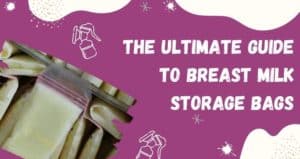-
Author: Khushboo Kirale
- >> Post Created: September 28, 2020
- >> Last Updated: April 27, 2024

How to stop breastfeeding & Faq's - Table of Contents
When you are breastfeeding, you feel happy that you are helping your baby grow and develop. During the feeding time, you create a very special bond with your baby, and it’s something you will always cherish.
But there comes a time when you will have to start weaning your baby. This might be a difficult time for both of you, and it’s not going to be an easy decision to take. The baby might cling to you more and sometimes even you might not want to leave the baby.
You might start thinking ‘how to stop breastfeeding?’ as there are just too many emotions which are at play.
But to ensure better growth and development of the child, their food intake needs to change as your breast milk nutrient composition changes over time; therefore, you need to supplement those nutrients through solid foods to maintain a steady growth and immunity for your child.
So you and your baby have to start getting ready and introduce the change slowly and steadily.
To help you in weaning your baby without any hassle, we have certain key pointers that can help you in answering your question on – “How to stop breastfeeding?.”
We have also gathered a list of frequently asked questions that can help answer many of the questions that you might have regarding weaning and when/how to stop breastfeeding.
10 tips on how to stop breastfeeding
How to stop breastfeeding – Tip 1
Introduce Formula milk
Mother’s milk is irreplaceable, but formula milk comes close enough. No wonder it becomes the natural choice of mothers as an alternative to breast milk.
But don’t directly substitute breast milk with formula milk, a gradual transition is important. Start by replacing 1 feed in 2 days with formula.
Remember that formula milk is a bit heavier than breast milk and the transition may cause gases on the flip side. On a plus side, your baby may feel fuller for a longer period.
In very rare cases, a particular brand of formula milk may not suit your baby. Keep monitoring for signs of rashes or stomach upsets. Speak to your pediatrician if there are any major issues in acceptance from your baby.
How to stop breastfeeding – Tip 2
Distract with activity
Sometimes you may notice that even though your baby is not hungry, they will look for you and start suckling just to relieve some anxiety that they might have.
Your baby does not want to feed. The child just wants to play with you, stay close and feel your touch.
During this time, try and divert your baby’s attention and indulge them in some activities, songs, or toys, which are known to entertain your baby.
How to stop breastfeeding – Tip 3
Emphasize on solid foods
Generally, your baby would be ready for solid foods by around 6 months, i.e. by the time they start teething. It would be good to start with liquids, but you should focus on gradually introducing solid foods too.
The baby is ready after 6 months to eat solid food, and their readiness to accept solid food increases as they grow old.
Initially introduce foods in a smooth, consistent, soft, thin, gooey pastes, generally milk based to start with, and then slowly progress them to semi solids and solids.
Read this next
How to stop breastfeeding – Tip 4
First choice—alternatives to breastfeeding
As you are weaning your baby, you should try and condition yourself slowly to choose to give your baby alternatives to breastfeeding like formula or solid foods.
Till you consciously make an effort to move away from your first and obvious choice of breastfeeding, you will not be able to wean your baby.
Hence, as your baby gets hungry, you should start focusing on providing and keeping alternative feeds ready to smoothen the process of weaning. If you take time to prepare alternative foods, babies tend to get cranky and irritable.
How to stop breastfeeding – Tip 5
Use a pacifier
Just the way you may relish or despise some food items, your baby is bound to do the same too; this may be because of your baby’s taste preference.
It is quite possible that the solid food options or formula milk that you may be giving your baby may be the reason for these aversions. We recommend that you try changing the options and see if that helps.

How to stop breastfeeding – Tip 6
Try changing the food or formula options
As you are weaning your baby, you should try and condition yourself slowly to choose to give your baby alternatives to breastfeeding like formula or solid foods.
Till you consciously make an effort to move away from your first and obvious choice of breastfeeding, you will not be able to wean your baby.
Hence, as your baby gets hungry, you should start focusing on providing and keeping alternative feeds ready to smoothen the process of weaning. If you take time to prepare alternative foods, babies tend to get cranky and irritable.
How to stop breastfeeding – Tip 7
Change your approach
Changing your approach may help too. This means that if you offered formula milk or solid food for lunch to your baby, you might offer it as a dinner option the following day. Experiment and try different combinations and see which one your baby accepts and settles with.
How to stop breastfeeding – Tip 8
Seek your partner’s help
Sometimes you may struggle to feed solids to your baby, but if someone else does it, there are chances that they may accept it.
This is because your baby may associate you with someone who breastfeeds and thus he may be reluctant to take any other form of food from you.
Although the transition will happen, it may be a good idea that someone else begins it.
How to stop breastfeeding – Tip 9
Make a routine
Sounds strange, but babies like to follow a routine. This is because anything that is not usual or abrupt may create aversion or a feeling of discomfort in babies. If you set a routine, i.e., if you feed your baby at a set time every day, this may give your baby an idea of what he may expect during that time and slowly he may accept the change.
How to stop breastfeeding – Tip 10
Change comfort zones
I had a few designated spots in the house where I would breastfeed my babies. Even if I sat in those spots casually, my babies would come to me and expect to be fed. So when
I wanted to start the weaning process, I ensured that I avoided those places while feeding them other things. They started accepting other food when they were not in those places where I breastfed them.
In case you also have these places where you breastfeed your little one, avoid them when you are to feed them other things.
This concludes my 10 tips on how to stop breastfeeding.
Few FAQs on when/how to stop breastfeeding
Many women have tons of questions related to weaning and furthermore when and how to stop breastfeeding. If you are one of those too, we have few of your frequently asked questions answered in this section.
Q1. Is there really a good time to stop breastfeeding?
Breastfeeding is a powerful act that not only provides your baby with the necessary nutrients for growth and building immunity, but also it helps in creating a deep and strong emotional bond with your baby.
So if you decide to wean your baby, keep in mind that you need to understand when would it be the right time—right age to wean.
You need to exclusively breastfeed your baby as much as possible till about 6 months. For the next 6 months you can introduce appropriate family foods along with breastfeeding.
After your baby is a year old, you can consider to wean your baby. By this time your baby has built a good enough immunity and is healthy enough to sustain any kind of infections.
Q2. Is it safe to breastfeed while being pregnant?
It’s perfectly safe to breastfeed even if you are pregnant, provided you are in the best of your health.
As the AAFP describes it, nursing during pregnancy is not detrimental to your pregnancy. “If the pregnancy is normal and the mother is healthy, breastfeeding during pregnancy is the woman’s personal decision,” AAFP explains. Many women happily nurse throughout their pregnancy and continue to tandem nurse both kids after birth.
However, you need to follow dietary guidelines prescribed by your doctor as your infant and the baby in your womb needs nutrients and you need energy to sustain this.
There could be times when your healthcare professional may want you to wean your infant early citing any health issues they observes in you.
It is always advisable to follow your healthcare providers’ advice in such scenarios.
Understandably, many women decide to wean during pregnancy, as the idea of nursing more than one child sounds difficult or exhausting. If you decide to wean, make sure to do it gently. If your child is under a year old, ensure that their nutritional needs are met.
Q3. When is it safe to introduce solid foods to your baby?

In the beginning, breast milk or formula should be the primary source of nutrition for your baby for at least a year.
Even WHO recommends exclusive breastfeeding during the first 6 months. Post that you can gradually start introducing age appropriate alternative foods along with breast milk and formula for a year.
You could continue doing so till about two years or even more based on your baby’s and your comfort levels. Keep reducing the amount of breast milk consumed gradually, but ensure that it still forms an integral part of your baby’s balanced diet.
Look out for these indicators which imply your baby is ready to start solid foods:
- Start showing interest when others are eating
- Start making gestures that seem to say ‘feed me too’
- Stop pushing out any food put in their mouth (disappearance of the tongue-thrust reflex)
- Start being able to hold their head up and sit without support.
You could also check with your paediatrician or healthcare provider.
Q4. How to stop breastfeeding at night?
When you try to wean your baby, you might experience more challenges during the night weaning sessions. In most cases, a woman’s body is capable of producing more milk during the night time or early mornings.
In order to help your baby’s transition from breast milk to other sources of food, you can offer a high-calorie diet during the daytime so that your baby feels full towards the night.
Also, you may concentrate on offering breastfeeds in the afternoons, or early evenings only, that is somewhere from 1–7 PM.
Q5. How long can a baby take to stop breastfeeding?
Although it depends from baby to baby, on an average, a baby may take a few weeks to even a couple of months to wean off completely. It may also depend on how consistent you may have been with your efforts and how effectively your baby copes up with the weaning process.
Q6. What happens when you stop nursing?
It is not only your baby who may experience difficulty when you begin weaning off, but you may also experience a few changes. Here’s what may happen to you:
- Once you start weaning off your baby, the hormones in your body start changing. The levels of oxytocin and prolactin may drop substantially, leading to hormonal imbalance. This hormonal imbalance may cause symptoms of depression and excessive mood swings.
- Your breasts may become tender or sore to touch; this may happen due to milk accumulation in the breasts. In some cases, breast engorgement may occur, which may be an extremely painful condition. For this reason, it is suggested that weaning off should be a gradual and not a sudden process.
- If you did not have periods while breastfeeding then worry not because soon you will have those four days of the bloody show. Many breastfeeding mothers may not have their periods until they stop breastfeeding their babies, this condition is called temporary infertility or lactational amenorrhea. Therefore, you may begin menstruating soon after you wean off your baby.
- Many women tend to put on a few pounds after they stop breastfeeding their baby. This may happen because of extra calorie intake that happens during the breastfeeding days and which may not go down the moment you wean off your baby. However, this may be controlled with strong willpower. But it may still take a few days or few weeks of time to cut down on the calories.
Q7. Can I resume breastfeeding after weaning?
Seeing your baby struggling with the discomfort of weaning off may make you feel bad. You may wonder whether you did the right thing or could you have waited for some more time and nurtured the sweet, intimate bond with your baby.
It is very normal for both mommy and baby to experience the withdrawal symptoms. However, if you wish to resume breastfeeding, you may do so, and it is called re-lactation. But it may be effective only if it is started soon after the weaning. Also, it may be easier for you to get your milk supply going if your baby is less than six months of age.
In the case of babies older than a year, it may take a lot of effort on your part. In most cases, your milk supply may not be the same as before. We recommend that you should plan to stop breastfeeding your baby when you are physically and mentally prepared to do it only.
Q8. When will the breast milk dry up after I stop breastfeeding?
Your milk supply may diminish considerably within a few days after weaning. However, it may take weeks and in some cases even a year or two, for your breast milk to completely dry up.
Even when you stop breastfeeding your baby, you may notice occasional drops of milk oozing from your nipples. However, if you experience any kind of secretions a few years after stopping, which may be accompanied by pain or any other symptoms, it surely may be a cause of concern. Get yourself thoroughly checked for the same.
Q9. My baby is already eating three meals a day. Can I completely stop breastfeeding then?
As your baby grows, you are already aware that breastfeeding is not just nutrition. Your baby could eat a ton, they will still come to you for breast milk as a snacks or a drink and more importantly comfort.
When your baby becomes a toddler, you will notice that your baby may not come to your breast for the entire day and be most comfortable with all alternatives you provide. But at nap time, or maybe early morning they will come to you for breastfeed. A few babies may come to latch on when they are feeling exhausted after hours of toddling around.
A few babies are known to latch on just for reassurance as well.
Q10. Should I stop breastfeeding when my baby gets teeth?

Your baby getting teeth should not be a reason to wean. Breastfeeding happens due to the sucking action which does not involve gums or teeth, but lips and tongue. So you should not be too concerned about biting until your baby really clamps down hard.
Q11. How old is too old to breastfeed?
Again, there’s no upper limit here. Yes, you’re going to get advice and opinions from everyone you meet. But all major health organizations agree that there’s no breastfeeding age that’s harmful to children. As the AAP explains, there’s “no evidence of psychological or developmental harm from breastfeeding into the third year of life or even longer.”
Final thoughts
Breastfeeding creates a natural bond between the child and the mother, no wonder it can become a little difficult to let go for both of you. You might even think that your child will not need you anymore if you stop breastfeeding and your special bond will break.
Rest assured, your child will always need you (even when they have had their own children).
Going slow and steady is the key in the weaning process and it will help you and your baby to acclimatize to the situation a little better. Don’t rush, and don’t start the process if you are not ready.
Try the tips provided in the article, they do help. I have tried these 10 tips on how to stop breastfeeding and so have many of my friends, they do work. If you have any other tips feel free to spread the knowledge in the comments.
We have also tried to address many of the queries that you may have in this article on – 10 Tips on How to Stop Breastfeeding & the Faqs, but if there are any more queries that you need answered, feel free to leave a comment or email us and we will try to address the same.
And remember, a mother always knows what is best for her baby; thus, it is very important to listen to your instincts when it comes to weaning off your little bundle of joy. We have made efforts in bringing you some of the best possible options that may help you in doing this tedious task with ease through these 10 Tips on How to Stop Breastfeeding & the Faqs.
Happy weaning!







WONDERFUL Post. thanks for share.. …
Thanks , I’ve recently been searching for information about this subject for ages and yours is the best I have discovered so far.
Thanks Mia. Your words really made our day.